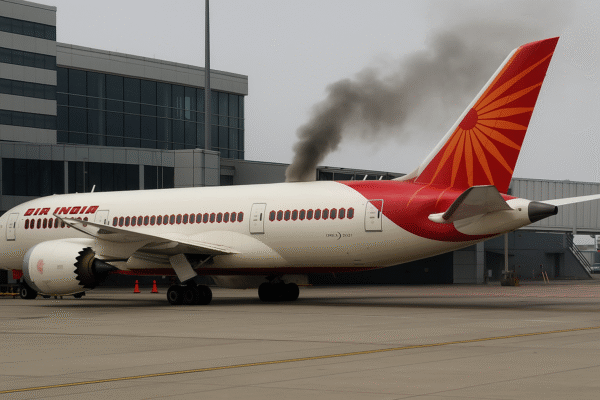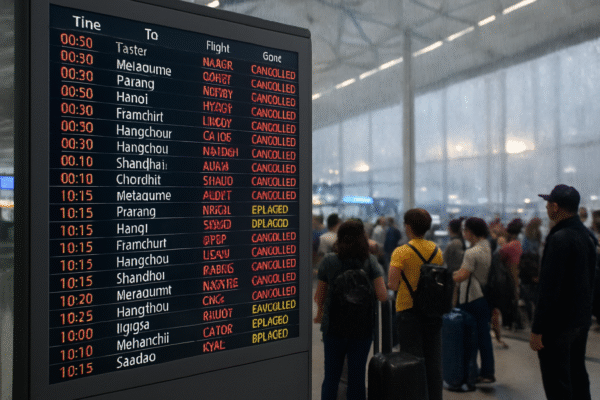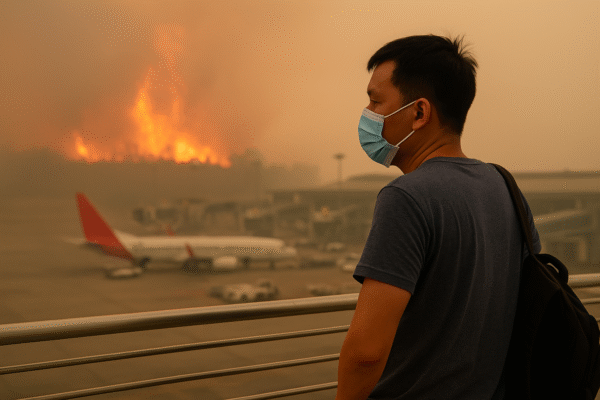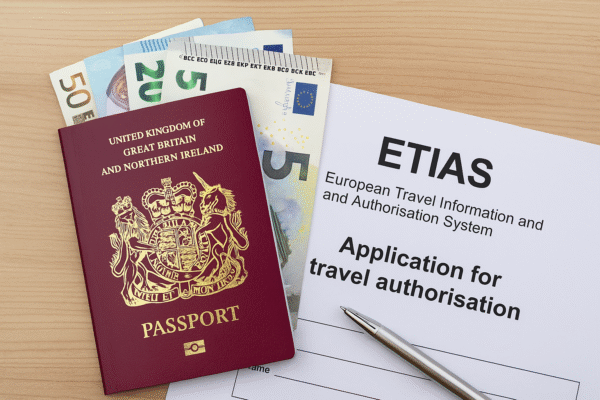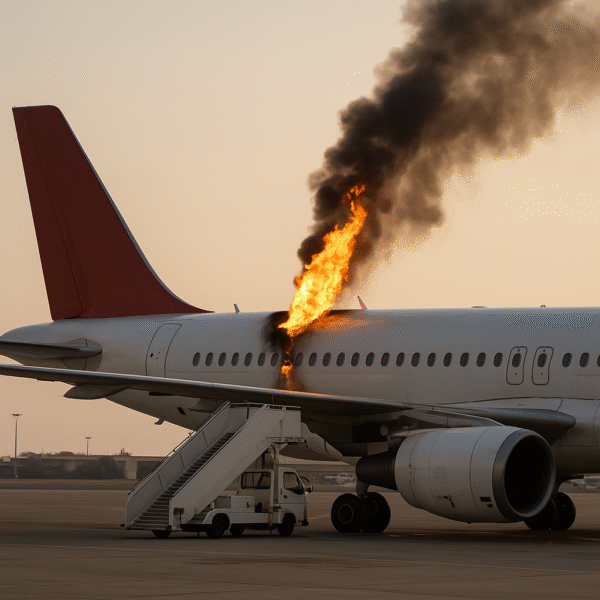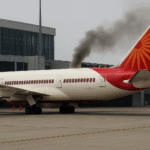Severe Weather Crisis Grounds Over 600 Flights Across Asia, Impacting Travel from Hong Kong to India
A powerful storm system sweeping through East and Southeast Asia has caused unprecedented travel disruptions, grounding over 600 flights and affecting some of the continent’s busiest aviation hubs. Airports in Hong Kong, Singapore, China, Japan, India, and beyond have experienced extensive cancellations and delays as airlines scramble to manage operations amid relentless rainfall, thunderstorms, and fluctuating wind patterns.
According to real-time data from regional aviation authorities and flight-tracking platforms, Hong Kong International Airport (HKG) has been the worst affected, logging more than 1,100 cancellations and 1,500 delays over four days. On Saturday alone, the airport recorded 441 delays and 294 cancellations due to severe thunderstorms and reduced visibility.
Beijing Capital International Airport (PEK) followed with 82 cancelled flights and hundreds of delays over the same period, while Singapore Changi Airport (SIN) experienced 39 cancellations and over 1,000 delays as tropical rain systems disrupted operations across the island nation.
Airlines Bear the Brunt of Widespread Disruptions
Leading Asian carriers including Cathay Pacific, Air China, Singapore Airlines, Korean Air, AirAsia, Air India, and ANA reported mass cancellations. Cathay Pacific, based in Hong Kong, alone accounted for more than 245 cancelled flights as storm conditions made inbound and outbound operations near impossible for days.
Other airlines heavily impacted include:
- Air China: 35+ cancellations across Beijing and Shanghai
- AirAsia: 30+ grounded flights, primarily affecting Kuala Lumpur and Manila
- Air India: At least 10 cancellations from Delhi, Singapore, and Bangkok
- All Nippon Airways (ANA) and Air Japan: 14 cancellations across Tokyo and Southeast Asian routes
In total, over a dozen airports across Asia experienced ripple effects, underlining the interconnectivity of the region’s airspace. Cancellations were also recorded at Bangkok Suvarnabhumi, Kuala Lumpur International, Tokyo Haneda, Seoul Incheon, Jakarta Soekarno-Hatta, Manila NAIA, and Delhi Indira Gandhi International Airport.
Four Days of Disruptions: Airport-by-Airport Impact
Hong Kong International Airport (HKG)
- Saturday: 294 cancellations, 441 delays
- Sunday: 210 cancellations, 350 delays
- Monday: 120 cancellations, 200 delays
- Tuesday: 80 cancellations, 180 delays
Singapore Changi Airport (SIN)
- Saturday: 300 cancellations, 500 delays
- Sunday: 250 cancellations, 400 delays
- Monday: 180 cancellations, 350 delays
- Tuesday: 100 cancellations, 250 delays
Tokyo Narita International Airport (NRT)
- Saturday: 250 cancellations
- Gradual improvement by Tuesday with delays reduced to 200
Delhi Indira Gandhi International Airport (DEL)
- Saturday: 200 cancellations, 350 delays
- Continued disruptions through Tuesday with 120 cancellations, 200 delays
Kuala Lumpur International Airport (KUL)
- Saturday: 180 cancellations, 320 delays
- Tuesday still saw 110 cancellations, indicating lingering impact
Across the board, most airports reported the most significant weather impact between Saturday and Monday, with Tuesday marking the start of partial recovery. However, backlog from the weekend and rescheduled flights have continued to cause operational congestion.
Meteorological Factors and Government Warnings
Meteorological agencies in each country have confirmed that the weather system is related to a combination of the East Asian summer monsoon and tropical disturbances forming over the South China Sea and Bay of Bengal.
- The Hong Kong Observatory issued multiple amber and red rainstorm signals.
- The India Meteorological Department (IMD) issued alerts for heavy rain across Delhi, Mumbai, and northeastern states.
- The Singapore National Environment Agency (NEA) warned of continued thundery showers through the week, impacting aviation conditions.
These alerts contributed to proactive flight cancellations by airlines attempting to minimize risk and manage customer safety amid unstable atmospheric conditions.
Travelers Urged to Monitor Flights and Avoid Non-Essential Travel
Authorities across the region have urged travelers to check their flight status regularly via airline websites and airport apps. Many carriers are offering free rebooking, refunds, and waivers on change fees as they respond to high volumes of disrupted itineraries.
Local transportation and tourism agencies, including the Civil Aviation Authority of Singapore (CAAS) and India’s Ministry of Civil Aviation, have released advisories encouraging travelers to defer non-essential journeys where possible and to allow extra time for airport security and customs checks amid delayed schedules.
Long-Term Impact on Tourism and Air Travel Recovery
The timing of the disruption comes as Asia’s tourism industry enters peak summer season, with millions of international and domestic travelers expected to fly through regional gateways. Analysts warn that this severe weather episode could have lasting effects on tourism recovery, especially in areas already grappling with post-pandemic capacity challenges.
“Given how interconnected Asia’s flight paths are, a weather crisis in Hong Kong or Singapore can have cascading effects as far as Tokyo or Delhi,” said aviation analyst Dr. Rohan Batra of the Asia-Pacific Transport Institute.
Cathay Pacific and Singapore Airlines have both said they are working closely with airport authorities to clear backlogs, reschedule stranded passengers, and maintain essential international connections.
Looking Ahead
While weather conditions are forecast to gradually improve mid-week, further storm development remains possible. Travelers are advised to remain alert, particularly if flying through airports in East Asia, Southeast Asia, or South Asia this week.
As airlines work toward full operational recovery, the crisis serves as a stark reminder of the growing challenges that climate-linked weather events pose to global aviation and tourism logistics.
For more travel news like this, keep reading Global Travel Wire




